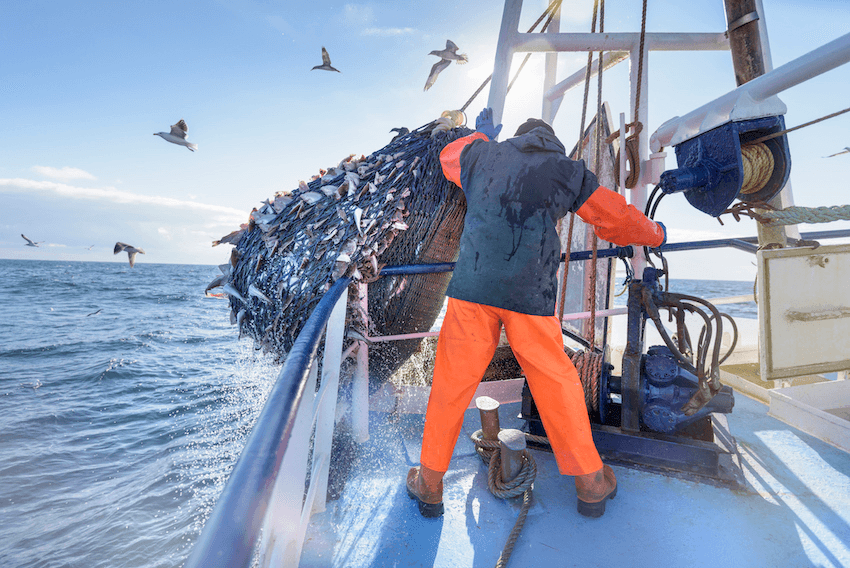New Zealand’s fishing boats were all supposed to carry cameras by the end of the month. And then they weren’t. With Greenpeace pointing fingers at NZ First for the delay, MP Shane Jones says he won’t accept criticism from the ‘green blowfish’ anymore.
The government’s decision to delay the installation of monitoring cameras on fishing boats is being condemned by critics as the latest sign that the Labour-led coalition has been gutless when facing the seafood industry.
A pattern of delay and scuttling has emerged over the three years of the current government when it has faced a decision that could impose stricter environmental rules on the fishing sector. A call for an independent review of New Zealand’s 30-year-old fishing rules was ignored, a seabird protection plan was dismissed by critics as pro-business and the cameras have now been delayed until late 2021 at the earliest.
The National Party and Greenpeace have suggested that the government’s moves reflect NZ First undermining Labour and the Greens at the cabinet table, however NZ First MP Shane Jones dismissed the allegation in an interview with The Spinoff. His ardent vocal support for fisheries in parliament and reports that he’s received financial backing from the industry isn’t reflected in the government’s decisions, he said.
“Any suggestion that our caucus has specifically focused on undermining the need for better surveillance or monitoring of the fishing industry is just further political toxins from the green blowfish that occasionally shows interest in me,” said Jones.
After successful trials with the cameras in 2012, the previous government passed regulations in 2017 requiring all commercial fishing vessels in New Zealand waters to carry the cameras by April 2018.
The current Labour-led coalition first announced a brief delay until late 2018, then 2019, then 2020 and now until late 2021 at the earliest. At each delay the government has said it has needed more time to draft rules, understand the industry, or now, to develop a completely new relationship with fisheries. After nearly a decade of waiting, environmental groups say disappointment has turned into exasperation.
“We’re seeing delays and stalls and about-turns on a whole lot of legislation that would impact fishing by this government. There seems to be a pattern that legislation that affects fishing and the marine environment is held up,” said Jessica Desmond, the oceans campaigner at Greenpeace.
International experience with the cameras, as well as the trials in New Zealand, show that boats outfitted with the cameras report catching seabirds and endangered dolphins in their nets up to seven times more often than boats operating under a system of self-reporting.
The cameras are pointed at the sterns of the vessels and document everything that gets pulled up.
On Tuesday, the government quietly changed the date for the installations until October 1 2021. However, that date is flexible and camera installation might not be required to begin until after then.
NZ First’s Jones is the government’s regional development minister and technically has no official role related to fisheries, however he has long historical links with the industry in both the private and public sector.
“I’m not going to rollover and hide under a rock when it’s pointed out that historically I came from the fishing industry or publicly declared in the past financial support from the industry. I’m very proud of the associations I’ve had with the industry,” said Jones.
The foundation that funds NZ First has also received tens of thousands of dollars in previously undisclosed donations from the seafood industry between 2017 and 2019. Greenpeace has called for an investigation into revelations from Stuff and RNZ about the donations.
“It’s surprising that New Zealanders see themselves as environmental stewards and this government sees itself as an environmental steward and this delay is happening,” said Desmond.
A spokesperson for fisheries minister Stuart Nash said the government is developing a new framework to monitor the country’s commercial fishing fleet and the cameras need to wait until that process is finished.
“The extension of the rollout date is a purely administrative change; If this change is not made, fishers will not be able to fish legally from this date, potentially putting livelihoods at stake at a time of national crisis,” wrote the minister’s spokesperson. Boats without cameras would not have been able to sail without the cameras after July 1 under the previous rules.
In a statement, the Greens said they were disappointed with the delay and would look to work with their partners in government to swiftly introduce the cameras. Nash also told reporters this week that he supports the cameras.
According to Jones, the government’s work on a new framework with the commercial fishing industry means the delay is a good idea. Asked if the cost of the cameras was an issue for the industry, which has not supported the new surveillance in the past, he said it likely wasn’t. “They can more than likely pay for it themselves,” he said.
The government currently requires cameras or human observers on boats operating in the habitat of endangered Māui dolphins. According to a study, the observers have reported up to nine times more dolphins being caught than unmonitored boats.
National MP Jacqui Dean, the party’s spokesperson on conservation, said in late May that the current government’s pledges to protect the country’s marine wildlife rings hollow without more action. “This is clearly another case of NZ First undermining Labour and the Greens at every step. Now the government is blocking simple, practical measures that would save dolphins and seabirds,” she said.
Seafood New Zealand, which represents the fishing industry, declined to comment.

